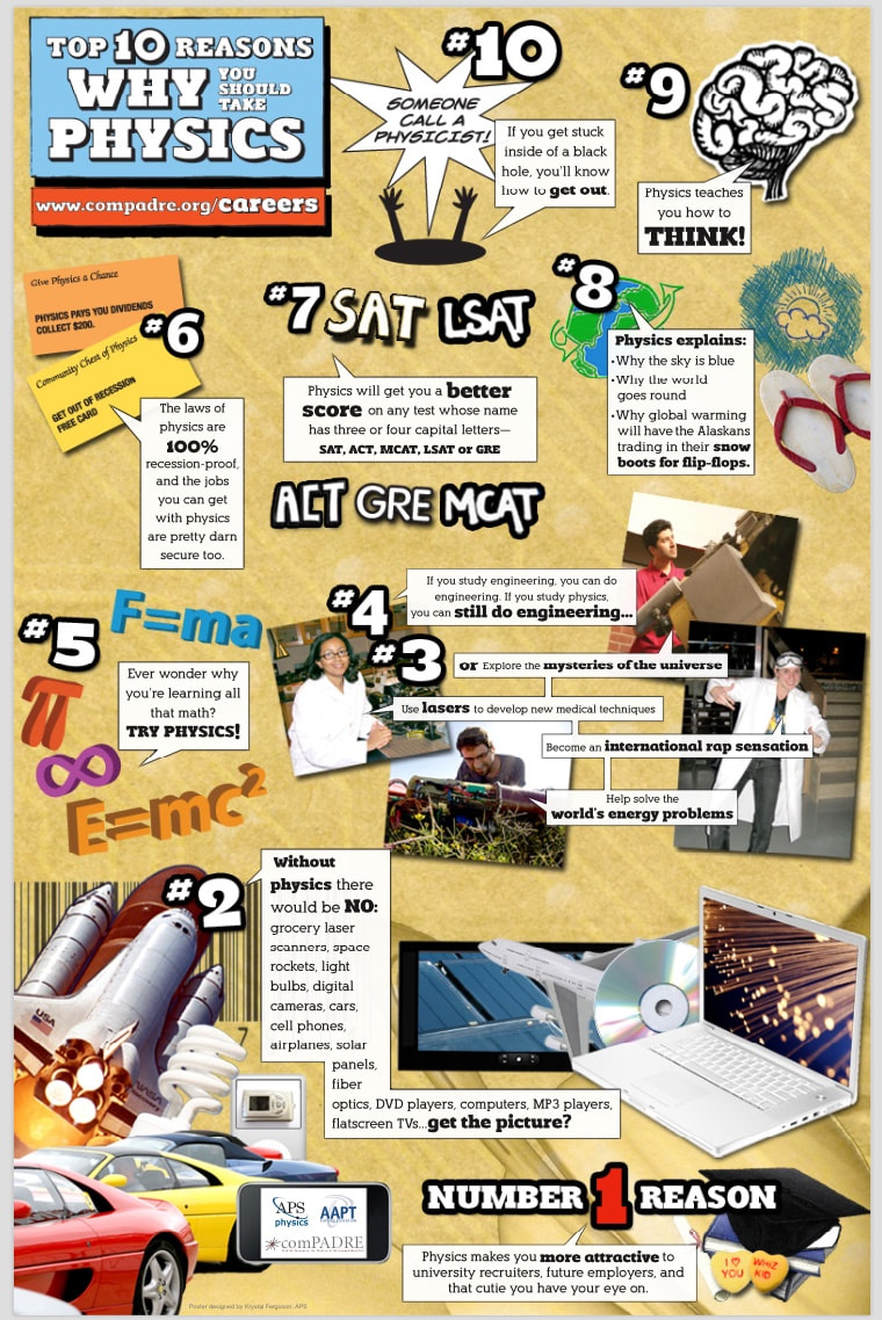Why take Physics? Which course is right for you?*
|
Click on the button to learn more about Physics Careers -->
|
Did you know you can take physics BEFORE you take chemistry?
|
Physics - course number 247 - 1st year course
The focus of this course will be to develop a better understanding of the physical laws that govern nature through conceptual and mathematical processes and an inquiry-based laboratory approach. Topics, from the Ohio Model Curriculum, include kinematics (position, velocity and acceleration of objects), as well as forces, energy and its conservation, electricity, and magnetism. Laboratory skills will be designed to encourage problem solving and independent thought, and a variety of tools and technology will be used for collecting and analyzing data. This course is designed to prepare students for a college major that requires science.. AP Physics 1 - course number 256 - 1st year course AP Physics 1 is an algebra-based, introductory college- level physics course that may be taken with no prior physics coursework. Students cultivate their understanding of Physics through inquiry-based investigations as they explore topics such as Newtonian mechanics including rotational motion and torque, momentum and impulse, work, energy and its conservation. In addition to Newtonian mechanics topics of mechanical waves and sound, electrostatics, and direct current (DC) circuits with resistors will be developed. Instruction will focus on the big ideas typically included in the first semester of an algebra- based, introductory college-level physics sequence and provide students with enduring understandings to support future advanced course work in the sciences. Through inquiry-based learning, students will develop critical thinking and reasoning skills, as defined by the AP Science Practices. At least twenty-five percent of instructional time is devoted to hands-on laboratory work with an emphasis on inquiry-based investigations and design projects. Investigations will require students to ask questions, make observations and predictions, design experiments, analyze data, and construct arguments in a collaborative setting, where they direct and monitor their progress. Frequently asked questions about AP Physics 1 AP Physics C - Mechanics - course number 259AP - 2nd year course
If you are planning on a science or engineering major in college the College Board recommends taking this course. You should have completed or be taking at least Pre-Calculus or higher for this class. This course is the equivalent of a college calculus-based physics course in Mechanics following the prescribed curriculum as published by the College Board. Engineering, mathematics, medical and pure science majors may use this course to deepen their understanding of college physics principles and procedures. AP Physics C: Mechanics will emphasize higher order thinking and problem-solving skills in the laboratory and theoretical settings. Students will need to be motivated and self-directed in both individual and team-based work. Advanced Placement courses are demanding and require work outside of class. Topics in this Mechanics course include advanced study of kinematics; Newton’s laws of motion and forces; work, energy and power; systems of particles and linear momentum; circular motion and rotation along with moment of inertia; and oscillations and gravitation. This course will feature several building and design projects where students can demonstrate their understanding of course topics. Given time, additional topics may include the study of fluids and thermal physics. AP Physics C - Electricity and Magnetism - course number 258AP - 2nd year course If you are planning on a science or engineering major in college the College Board recommends taking this course. You should have completed or be taking at least Pre-Calculus or higher for this class.This course is the equivalent of a college calculus-based physics course in Electricity and Magnetism following the prescribed curriculum as published by the College Board. Engineering, mathematics, medical and pure science majors may use this course to deepen their understanding of college physics principles and procedures. AP Physics C: Electricity and Magnetism will emphasize higher order thinking and problem-solving skills in the laboratory and theoretical settings. Students will need to be motivated and self-directed in both individual and team-based work. Advanced Placement courses are demanding and require daily work outside of class. Topics in this Electricity and Magnetism course include an advanced study of electrostatics and electric fields; conductors, capacitors and dielectrics; electric circuits (both DC and AC); magnetic fields and forces; and electromagnetism including RLC circuits and Lenz’s Law. This course may include building and design projects where students can demonstrate their understanding of course topics. Given time, additional topics may include the study of optics and modern physics (relativity and quantum physics). Frequently asked questions about AP Physics C: Mechanics Frequently asked questions about AP Physics C: Electricity & Magnetism AP Credit Policy Search Find colleges and universities that offer credit or placement for AP scores. Begin your search by entering the name of the institution below. For the most up-to-date AP credit policy information, be sure to check the institution's website. https://apstudent.collegeboard.org/creditandplacement/search-credit-policies |
Careers that Physics helps you get (Full List):
Careers using Physics from Physics.org http://www.physics.org/article-careers.asp?contentid=435&hsub=1&type=study&pid=404 |
Congrats you made it to the end of the page! If you made it this far come see me to get a reward! In order to get the reward when you see me stand on your left leg, raise your right hand above your head and say "Physics Rocks!" 4 times! Terms and conditions may apply!

